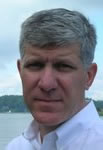FIGHT FOR THE BAY: WHY A DARK GREEN ENVIRONMENTAL AWAKENING IS NEEDED TO SAVE THE CHESAPEAKE BAY

Howard R. Ernst, Ph.D. - Associate Professor of Political Science, U.S. Naval Academy |
Friday November 20, 2009
12:30-1:30 p.m.
Crawford Hall - Room 9
Inamori Center
Case Western Reserve University
Dear Colleagues,
For people interested in sustaining vital ecosystems, few cases are as important or interesting as the Chesapeake Bay.
It is, or was once, a uniquely rich environment, in which the mix of fresh and salt water, land and sea, once sustained a lush marine life (particularly attractive to humans who like crustaceans). It is also adjacent to population centers, subject to human impacts not only directly but indirectly, through the rivers that feed it and runoff from the adjoining land.
But the Bay’s ecological complexity is matched by its political ecology. As is true of most large watersheds, government boundaries do not fit the geology. The national government, state governments and local governments; private and public actors; all must cooperate to “Save the Bay.” Voluntary environmental organizations play a large role in mobilizing and coordinating action – but sustaining that action is hard.
Therefore the efforts to remedy Chesapeake Bay’s degradation are one of the most broadly studied efforts in the field of environmental politics and policy. One leading figure in that work is Dr. Howard Ernst, Associate Professor of Political Science at the United States Naval Academy. He will talk about his work at our Friday Lunch discussion – and we can use that to think about not just the Chesapeake, but the politics of Sustainability more broadly.
As usual, we will gather in Room 9 of the Inamori International Center for Ethics and Excellence, on the lower level of Crawford Hall, for free cookies, beverages, and brown bag lunch.
Best regards,
Joe White
About Our Guest
Howard Ernst serves as an associate professor of political science at the United States Naval Academy and as a Senior Scholar at University of Virginia’s Center for Politics. Dr. Ernst received his Ph.D. from the Woodrow Wilson School of Government and Foreign Affairs at the University of Virginia in the spring of 2000. While at the University of Virginia, Ernst received several academic awards, including the Governor's Fellowship, Bradley Fellowship, and University of Virginia's Graduate School of Arts and Sciences Dissertation Fellowship. Since arriving at the Naval Academy in the fall of 2000, Dr. Ernst has taught U.S. Government and Constitutional Development; Research Methods; Environmental Politics; Interest Groups, Parties and Elections; The Legislative Process; and a numerous capstone courses. He currently serves as the course coordinator for the Naval Academy’s core course, U.S. Government and Constitutional Development, and received an honorable mention for the Naval Academy’s APGAR Teaching Award in the spring of 2004.
Ernst's research focuses on the American political system, with special attention given to citizen influence on sub-national politics and environmental policy. Professor Ernst has published several books and academic articles, including: Dangerous Democracy? The Battle over Ballot Initiatives in America (Rowman & Littlefield, 2001); Chesapeake Bay Blues: Science, Politics, and the Struggle to Save the Bay (Rowman & Littlefield, 2003); The Encyclopedia of American Political Parties and Elections (Facts on File, 2005); and The Political Science Toolbox: A Research Companion to American Government (Rowman and Littlefield 2008). Dr. Ernst's most recent publication, Fight for the Bay: Why a Dark Green Environmental Awakening Is Needed to Save the Chesapeake Bay, was released by Rowman & Littlefield in October of 2009.
Dr. Ernst’s is best known for his work in the area of environmental politics and is considered a leading authority on the Chesapeake Bay restoration program. This publications have been adopted in courses as diverse as a graduate seminar at Yale University’s School of Forestry, New York University’s School of Law, and Johns Hopkins University’s School of Geography and Environmental Engineering, in addition to dozens of public policy courses taught in political science departments throughout the country. Beyond the his work's academic impact, Dr. Ernst's findings have been highlighted in numerous media outlets, including the Washington Post, National Public Radio’s Diane Rehm Show, and the PBS Frontline documentary (Poisoned Waters). Ernst’s work has resulted in invitations to testify before Congress and to guest lecture at institutions such as Yale University, New York University, Gettysburg College, Johns Hopkins University, University of Virginia, the Smithsonian Environmental Research Institute, the University of Maryland Center for Environmental Science, Catholic University, and other centers of higher education.
Friday Lunch Upcoming Topics and Speakers:
November 27: Thanksgiving Break
December 4: Health Care
Reform - So Far. With Joe White, Professor of
Political Science
The Friday Lunch discussions are held on the lower (ground) level of
Crawford Hall. Visitors with mobility issues may find it easiest to take advantage of special arrangements we have made. On most Fridays, a few parking spaces in the V.I.P. lot in between Crawford Hall and Amasa Stone Chapel are held for participants in the lunch discussion.
Visitors then can avoid walking up the hill to the first floor of Crawford by entering the building on the ground level, through the garage area under the building. The further door on the left in that garage will be left unlocked during the period before the Friday lunch. On occasion, parking will be unavailable because of other university events.
For more information about these and other Center for Policy Studies programs,
please see http://policy.case.edu.

